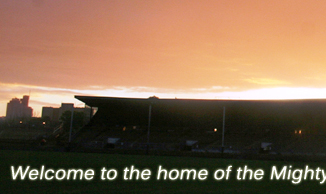

 |
||||||||||||||||||||||||||||||||||||||
|
|
||||||||||||||||||||||||||||||||||||||
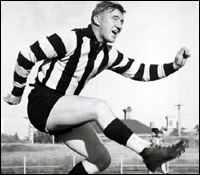 Bob Rose Bob Rose
"Play tough, play brave, play like Bobby Rose" Born: 7th August 1928 If we could all aspire to be like the late Bobby Rose Much has been written about our Bobby; how a boy from the bush came to town looking for a fight and wound up at Victoria Park kicking a Sherrin. Given the limited amount of space we have available we will just touch on some the more important aspects of Bob's involvement with the Collingwood Football Club. As a 16 year old, Bob Rose was an aspiring young boxer and champion centreman for the Nyah West Football club. In 1945 Nyah West won the premiership and Bob won the club’s and the Mid-Murray Football League's best and fairest awards. He came to Melbourne shortly after Christmas of 1945 after being invited to train with Collingwood. Bob was given a job at a local timber yard before Tom Sherrin offered him a position at the football factory where Bob learnt the art of stitching footballs together.
Bob debuted for the club at aged 17 in 1946. Bob's best season was by far 1953 were he featured as one of the best on ground in the defeat of Geelong in the grand final, he would also finish as Collingwood's leading goal kicker with 36, runner up in the Brownlow and he would win his 4th EW Copeland Trophy. Courage, passion and pride were the hallmarks of Bob's playing days. Bob would cut short his career at the end of the 1955 season at just 27 after only 152 games over 10 seasons to take up a captain coach role with regional side Wangaratta.
First Played for Rovers: 1956 Club Honors: Other Honors: A bombshell, which was dropped on Victorian football late in 1955, was the catalyst for the transformation of the Wangaratta Rovers from the ugly duckling of the Ovens and Murray League to a team to be feared. Bob Rose, “Mr. Football”, had decided to leave Collingwood and head back to the bush to coach. At 27 and with a trail of glorious achievements behind him, Rose took to his new appointment with great enthusiasm. His charisma was soon illustrated with the Club’s membership more than doubling. His first practice match appearance attracted an attendance of over 1,000. When Bob started to hit his straps after early injury problems, the crowds flocked to see him play. Backed by a strong administration, Bob traveled thousands of miles in pursuit of recruits and shaped an exciting new era for the Club. On the field he was a missile of muscle and determination who ran through opponents and packs, and provided inspiration to those under his charge. Endeavor, sure ball-handling and toughness were the hallmark of his play. Rose led the Rovers to premierships in 1958 and 1960, and many who were at the Albury Sportsground in 1959, say a poor umpiring decision robbed them of another flag. Despite the countless personal awards, the proudest moment for Bob Rose was surely the day he was chaired off the ground after guiding the Rovers to their very first flag in 1958. Some of the original, old Hawks were not too proud to shed a tear that day as they saw the culmination of all their dreams. Rose also won the Morris Medal in 1958 sharing it with Myrtleford coach, Jimmy Deane. In 1960 he pipped Benalla’s Ritchie Castles for the Morris Medal again and also shared the League goalkicking award in that year. Despite advancing years and restrictions through injury, Bob Rose’ last couple of seasons were probably among his best. In the 1962 first semi-final, he tore the Wangaratta Magpies apart and played his swansong in that season’s Grand-final against Benalla, when he accumulated 28 possessions before half time. It was a sad day for the Wangaratta Rovers when the siren sounded as it not only ended the gam but also the great playing career of a true champion. The history of Bob's time at Wangaratta Rovers was writen by Kevin B. Hill In 1963 the Collingwood football club was in turmoil as Syd Coventry had decided to hand over the presidency. Phonse had put his foot in it by speaking for the players without consulting them and in the process upsetting captain Murray Weideman. Murray was becoming increasingly disillusioned with football and like Bob left the club at just 27 to pursue other interests. Tom Sherrin was a good friend of Bobs and needed a trump card to pip Jack Galbally for the presidency. Even though Bob was to be that trump card, the position was not secured until Richmond jumped in and offered Bob a small fortune to coach their side. Bob was loathed to coach anyone other than Collingwood, but he did have aspirations to coach at the highest level. So he asked Collingwood, “Do you want me or not?” The decision was made after a vote of the board and Bob was only narrowly accepted, even after Tom had promoted the appointment as a grand new era for the club. Bob hit the ground running in 1964. Not surprising really as he had managed to secure two premierships in his time as coach of Wangaratta. Collingwood had played in the 1960 grand final, but were humiliated by Melbourne who sought revenge for the 1958 loss. 61, 62 and 63 were uneventful for Collingwood as the team appeared to be just making up the numbers and finished each season in the lower half of the ladder. Bob was a breath of fresh air and he took the boys to the grand final that year to once again play arch enemy Melbourne. The game was one of the all time greats with both teams throwing everything at the contest. Melbourne would triumph by just four points in the end but the club had restored some pride and the future looked very bright indeed. Perhaps if Murray Weideman had stuck around for one more year the outcome would have been a little different. 1965 would be another strong season and the Pies would face eventual premiers in the Preliminary final and go down by a massive margin. Faced with a long list of injuries, Bob was down to his last big man, Gabo. He had a big boy playing outstanding football in the reserves by the name of Len Thompson, but a Preliminary final was no place for boys. At Victoria Park training in the week before the game Bob sent Len to do marking practice with big Ray. When Bob saw Len taking species on his veteran ruckman he was furious. “Are you stupid boy?” to which Len replied “No”. The marking practice was for Gabo, not Len. The skinny 17 year old Len was made to stand under the 17 stone Gabo while Gabo practiced marking. When Len heard the rumble of Gabo approaching he immediately decided that he was not going to stand for this and shifted himself sufficiently enough to avoid a fatal impact with the giant man. Unfortunately for everyone, Gabo hit the ground so hard that he broke his ankle and was immediately ruled out of the game against Essendon. Bob was indeed left to debut young Len and it was like throwing Christians to the lions. Essendon won the game in a landslide. Injuries would not be a problem in 1966, Len Thompson had matured and several younger players like Des Tuddenham, Graeme Jenkin and Peter McKenna showed great promise. Tuddy won the EW Copeland Trophy the year before Bob arrived and was now handed the captaincy for the 1966 season at just 22 years of age. The Pies made another grand final and this time would face the premiershipless St Kilda. As in 1964, there was barely a kick separating the sides all day. With the sides level on 10.13 apiece, and only seconds left in the game, it would be an errant shot for goal that drifted through for a premiership winning point that would decide the game and St Kilda was to take the prize. The heart break was palpable at Collingwood. Two grand finals in three years and to lose both by just the solitary straight kick would have to take its toll. Aside from finishing 7th in 1968, Collingwood had strong seasons under Bob finishing 4th in 67 and 3rd in 69. Peter McKenna was emerging as one of the league's premier full forwards and after his 98 goals in 1969 at just 23 years old, he was starting to threaten the mighty records set by Nuts Coventry. Indeed Peter would take his place as Collingwood’s most prolific goal scorer in a season when he kicked 143 goals in 1970. Five of which were in the first half of the grand final against Carlton that set up a massive 44 point lead for Collingwood. Even though Macca and Tuddy had clashed heads badly late in the second quarter, the Pies were still in a buoyant mood going into the main break and then the unthinkable happened. Some idiot opened the change room doors and fans started to mill around the players, congratulating them on a job well done. Bob knew all too well that it was a job only half done. Rotten Ron sent his bluebaggers out with instructions to handball, handball, handball! This broke up Collingwood’s direct style of play and they clawed their way back into the game and eventually won it by 10 points. Bob had lost his third grand final in only seven seasons as coach and by a combined margin of just 15 points. This was to be the bitterest of defeats and Bob was forced to hand over the coaching position to 1958 premiership player, Neil Mann in 1972, even after Bob had got the boys and into the finals again in 71 to finish 4th. Bob moved on to Footscray and started to revolutionise a club that had nothing like the heritage and traditions of the Collingwood Football Club. But they did have ‘Mr Football’ Ted Whitten. A remarkable player cut from the same mold as Bob and like Bob, someone who inspired men to do great things. But Bob’s time at the Bulldogs would not be remembered for the football.
Ten years had passed since Bob had left Footscray in 1975 and his business activities and family were consuming more and more of Bob’s time and energy. Suddenly a call came from Alan McAllister, Collingwood president, in 1985. Jack Cahill was given the flick, or at least he resigned first before Al got the chance to boot him and Collingwood desperately needed a coach. But after the Hafey incident and then Jack’s sudden departure, who would coach Collingwood? The fact was that Al had put all his eggs in the one basket and expected Jack Kennedy to coach Collingwood in 1985 and when Jack announced he would coach North Melbourne this left Al in a difficult position. Bob was his only option and after consulting with Elsie, Robert and Peter, he decided to give it another shot. However, Bob was only ever going to be caretaker. Even so, he managed to secure some very good results and given that he had a list that contained, at one point, 21 injuries, including superstars Peter Daicos and David Cloke, he was doing very well with what he had. The club itself was self destructing with debts in excess of $3.5mil and the creditors circling like vultures but Bob did everything he humanly could to help out. Leigh Matthews took over midway through 1986 and eventually lead the Pies to a premiership in 1990. At last the Pies had a decent run of luck and Bob was there on the sidelines to soak it all up. He was not bitter or resentful towards the winners, there was no thought of ‘why couldn’t it be me?’ Bob simply congratulated Leigh and the players with all the humility and dignity we had all become accustomed to from this true champion of a man.
The Victoria Park Heritage Committee would like to urge all Collingwood people to support the Robert Rose Foundation by clicking the following links;
|
|
||
|
|
|||
| Site Map |
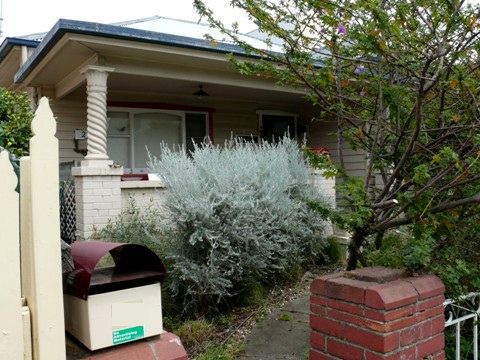
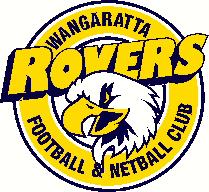 Wangaratta Rovers
Wangaratta Rovers 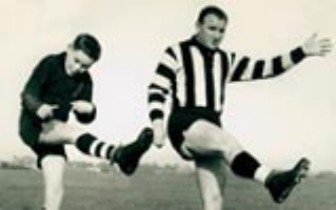
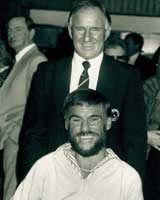 As if the tragedy of 1974 was not enough. The events of one day on the field in a game between Fitzroy and Footscray would stretch the agony and anguish beyond any reasonable limit for Bob. The game saw the Rose brothers, Bob and Kevin, pitted against each other as coaches of the two opposing sides. Bob had secured the services of a superbly talented and courageous South Australian footballer by the name of Neil Sachse and the mood around the Western Oval was good. Footscray were expected to win this game comfortably. However, one moment in time would change everything for Bob, Robert and the entire football world. Three years ago many were left wondering 'what is this game coming to?' when an act of criminal thuggery took John Greening out of the game and nearly killed him. On this Saturday afternoon a simple slip would leave Neil Sachse critically injured and motionless on the ground. It took some time for the stretcher to take Neil from the arena and off to hospital. The game restarted and Bob continued to coach his team and the Bulldogs ran out comfortable winners, but when Bob saw Robert he saw his son was uncharacteristically distressed and driven to tears. Robert knew exactly what had happened. Neil had suffered a massive spinal cord injury and was now a quadriplegic. The Footscray Football Club fell into disarray as many people abandoned the game for good. Bob was faced with another tragic outcome that required him to be as resolute as ever.
As if the tragedy of 1974 was not enough. The events of one day on the field in a game between Fitzroy and Footscray would stretch the agony and anguish beyond any reasonable limit for Bob. The game saw the Rose brothers, Bob and Kevin, pitted against each other as coaches of the two opposing sides. Bob had secured the services of a superbly talented and courageous South Australian footballer by the name of Neil Sachse and the mood around the Western Oval was good. Footscray were expected to win this game comfortably. However, one moment in time would change everything for Bob, Robert and the entire football world. Three years ago many were left wondering 'what is this game coming to?' when an act of criminal thuggery took John Greening out of the game and nearly killed him. On this Saturday afternoon a simple slip would leave Neil Sachse critically injured and motionless on the ground. It took some time for the stretcher to take Neil from the arena and off to hospital. The game restarted and Bob continued to coach his team and the Bulldogs ran out comfortable winners, but when Bob saw Robert he saw his son was uncharacteristically distressed and driven to tears. Robert knew exactly what had happened. Neil had suffered a massive spinal cord injury and was now a quadriplegic. The Footscray Football Club fell into disarray as many people abandoned the game for good. Bob was faced with another tragic outcome that required him to be as resolute as ever.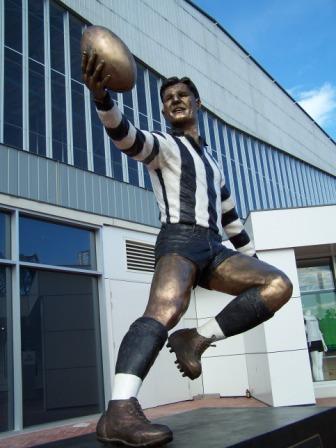 The S A Coventry Pavilion was extended in 1989 and the fully enclosed grand stand would be named
The S A Coventry Pavilion was extended in 1989 and the fully enclosed grand stand would be named 